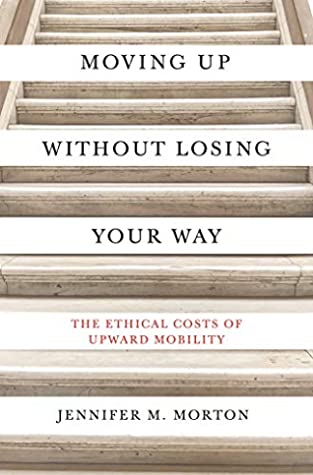What do you think?
Rate this book


192 pages, Hardcover
Published September 17, 2019
This clear-eyed ethical narrative is characterized by three central features: it is honest about the ethical trade-offs involved in striving, it clearly situates these choices in a specific socioeconomic and historical context, and it is ethical in that it encourages strivers to reflect on what is valuable and meaningful to them and on the impact they want to make on the world. (121)
This narrative provides not answers, but rather a framework that can help strivers confront the questions they will face in a reflective way. Such an approach involves putting together all of the elements we have discussed thus far: recognizing those aspects of one’s life that are valuable and meaningful but might be undermined in the process of moving up, situating those costs in the proper socioeconomic context in a way that recognizes the extent to which they disproportionately burden strivers, navigating the competing pressures on one’s identity that upward mobility creates, and resisting one’s complicity in a society that is unfairly structured so as to compound the hurdles already faced by those who are most disadvantaged. (124)
For example, the fact that childcare is expensive and difficult to procure in this country means that some strivers find themselves having to choose between providing childcare for their families and graduating on time. A hopeless response to this situation would be to decide that such a striver will ultimately fail to graduate and therefore might as well not try. A delusionally optimistic response would be to encourage this striver to go to college and work hard to achieve her goals without acknowledging what she might be giving up by choosing that path. The ethical narrative, by contrast, points to a middle road: it helps the striver to acknowledge the potential ethical costs of going to college—how her relationship with her family might be impacted by the decisions she will have to make in order to succeed in that path—but also the potential gains—a college degree will enable her to access opportunities that are likely otherwise unavailable to her family. The ethical narrative also requires that she understand the ways in which a lack of access to quality childcare plays a role in the challenges she faces and how others who are born into more fortunate circumstances are not subject to the same challenges. This broadens her perspective. She can now consider the role she could play in bringing more quality childcare to people growing up in communities like hers once she has attained a measure of socioeconomic success. This contribution might be as simple as voting for candidates who make this one of their policy priorities, or it might involve a much more profound grassroots engagement with this issue. It is here that she can find hope not just for herself, but for others like her. Hope becomes more than an empty promise; it is born from an honest assessment of the challenges she faces and the sacrifices she will have to make. From the reflection at the heart of the ethical narrative, the striver can see her life more clearly. And from that clarity is born a more honest version of a hopeful narrative. (148)
I am not suggesting that a clear-eyed ethical narrative will eliminate the feelings of conflict and struggle that strivers are liable to experience on the path of upward mobility, though some might take comfort from the clarity they have gained. Nor am I suggesting that this narrative will minimize the ethical costs strivers face, though it might help some thread the delicate needle between their two worlds. Nor am I suggesting that such a narrative would dramatically alter a striver’s situation, though it may encourage strivers to act in ways that play a role in making our society more just in the long run. The reason to embrace a clear-eyed ethical narrative is simple— it is more honest. It is more truthful in its recognition that in the path of upward mobility there is the potential for loss, that what might be lost is genuinely valuable, and that the responsibility for that loss extends far beyond individual students, their families, or their communities. (148-9)